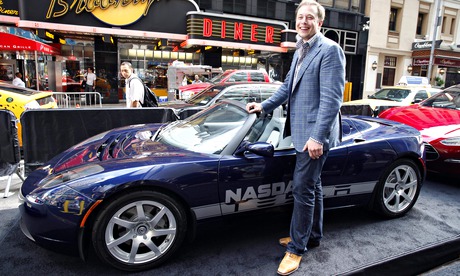News this week, from opposite ends of the planet, that points to the convulsion of change about to hit the global economy. The first report came from Palo Alto, California, headquarters of the Tesla electric car company. Tesla’s car produces no carbon emissions (so long as the electricity that charges its batteries is also low carbon). Tesla’s chief executive, Elon Musk, announced it would invest in a $4bn-$5bn “gigafactory” doubling the world’s production of lithium-ion batteries. These power your mobile phone, but also Tesla’s high-end luxury electric cars. The objective is to cut battery prices by 30% in three years, and to halve them by 2020.Since battery cost is the main obstacle to electric cars, this is potentially game-changing. It would allow electric cars with a 200-mile range to compete with the Ford Mondeo and not just the BMW 5-series (Tesla has already spurred the Bavarian luxury car-maker into an electric response).
Tesla is treading the route first mapped by Henry Ford, whose mass production of the Model T halved the price of US cars. The same happened with computer memory and, more recently, solar panels, whose price collapsed by half in just over a year.
Nor is scale the only likely development in batteries. There is work going on in nanotechnology, making things tiny. This allows a much greater surface within a given size of battery, so that charging will be quicker, and storage capacity higher. If scale and technology work their miracles, cheap batteries will disrupt many more industries than cars.
Most fundamentally, it will make the transition to low-carbon electricity far easier. Renewables like solar and onshore wind are coming down dramatically in price – the industry forecasts they will be cheaper than grid electricity in most of the world by 2025 – but they have a key disadvantage: they do not produce electricity when people want it.
This matters. The UK is typical in having an enormous variation in electricity use through the day, with demand when the kettles go on in the Coronation Street ads nearly double that in the early morning. Wind and solar cannot meet this without a cheap and effective battery solution.
Cheap batteries will revolutionise the renewable energy market

No comments:
Post a Comment